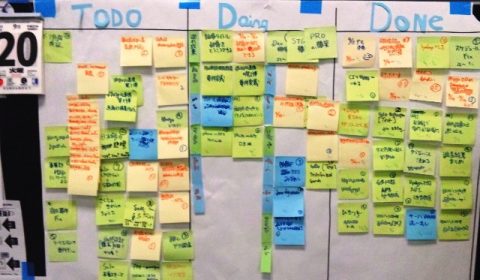Podcast: Play in new window | Download
Subscribe: Spotify | Email | TuneIn | RSS
A PhD takes years to complete, so it’s no surprise that your situation may change during that time. Your PI may move to a different University, your spouse may take a job in another town, or you may need to move back home to care for ailing parents.
In these situations, you’re forced to make a difficult choice: “Should I stay with my lab and finish my work, or find a way to finish this PhD remotely?”
That’s exactly the question we got from “Walker” this week. He and his wife desperately want to move to a new city, but he also wants to finish his degree.
Walker wrote:
I am currently in my third year of a PhD program in Computer Science and Engineering at a fairly prestigious university in the Midwest for graduate school.
My wife and I are both quite unhappy here. The weather is awful 11 months of the year, neither of us really feels safe here, and my wife can’t find any jobs here where she can actually apply her degree. I’m done with courses, my research is going alright, and I’m hoping to propose my thesis before the end of this year.
At this point, I have fulfilled my residence requirement, so I could possibly (with the ‘blessing’ of my adviser) complete my thesis as a non-resident meaning my wife and I could live wherever we want. I was hoping that you guys might be able to shed some light on the pros and cons to going non-res.
Walker’s case seems pretty clear-cut: he needs to get out of there! But for others thinking about finishing a PhD remotely, we have some important considerations to process in making your decision.
Is Remote Work Right for My Situation?
While there are some lifestyle and mental health benefits from living in a new place you love, it will almost certainly make your PhD research harder in other ways. Communicating with your advisor will be more cumbersome and less frequent. You’ll lose the support network of fellow grad students and access to libraries, seminars, and hallway conversations with other researchers.
That’s why it’s so important to plan ahead. Here’s a checklist to work through as you decide “Is this right for me?”
- Are your goals well defined?
- Do your advisor and committee approve of your research plan?
- Is your advisor or committee likely to change their minds?
- How long will it take to finish?
- Will you need local resources? (Lab equipment, core facilities, libraries, expertise, etc.)
- Is your personality a good match for remote work?
Question 6 is vitally important and perhaps difficult to answer if you haven’t ‘worked from home’ very often. If you’re the type of person who relies on external motivation and deadlines to finish a project, working remotely will be a challenge. Likewise, if you’re prone to feeling lonely or isolated, it may be tough.
But even these barriers may be overcome if you have a plan…
Remote Work, the Right Way
Finishing any project the size and scale of a PhD is all about motivation, project management, and persistence. Here are some things to consider when organizing the days, months, and years it will take to complete your PhD.
Environment
Figure out the best work environment to suit your needs.
Some people are happy and productive with a laptop on the couch, while others need a space where they won’t be distracted by chores, kids, or the TV.
Consider dedicating a space in your home where you eliminate distractions. Or try working from a coffee shop, library, or c0-working space in your community.
And of course, be sure to employ time-management techniques like the Pomodoro Timer and the Focus Funnel to keep yourself on task!
Project Management

Take your long-term goals (papers you need to publish or a list of dissertation chapters) and break them down into manageable pieces.
Track your progress with an online task management tool like Trello, Asana, or a To-Do app. Or try listing goals and tasks in a spreadsheet where you can check them off when they’re done.
For a lower-tech approach, you can write each task on a Post-It note and hang them on your wall, moving them to a “Done” zone when complete.
The point of all of these options is to force you to think through the work in advance, and to help you visualize your progress.
Communication
You won’t have the luxury of bumping into your advisor by the coffee machine, so you’ll need to be very intentional about your communication plan.
Figure out how frequently you’ll need to check in with your advisor or members of your team, and come up with a format for sharing your progress and requesting help. You may be able to share most updates via email, but plan on connecting by voice or video chat regularly.
You’ll also want to think about how frequently you’ll need to visit the University or advisor in person. Depending on distance, this may be costly, but it can be a valuable time to refine your research plan, meet with your committee, or utilize campus resources.
Collaboration
Depending on your field of study and the work you’re trying to complete, you may not need much input from your advisors or other team members. But if you’re collaborating on a project or expecting your advisor to edit your dissertation, tools matter.
Consider utilizing online resources like Google Docs, Dropbox, and Slack to stay in touch and edit your work. If you use an offline text editor like Microsoft Word, you’re likely to make changes while your advisor has a different copy under review. You’ll save time on merging conflicting changes if you’re both working from the same document.
While finishing a PhD remotely is no cakewalk, people do it all the time. Some students who go through the process said they felt more confident and independent, and if it puts you in a better place, it can be well worth the effort.
Vino-Evil
This week, we hear about the ever-expanding market to sell you things based on your genetic profile. No longer limited to 23andme and Ancestry.com, you can now send a sample of your DNA to learn what kind of wine you might like, what your babies will look like, and to personalize a pair of $130 socks.
I mean, it’s JUST your entire genetic profile. What’s the worst that could happen?
And to stay on-theme, we sample the Albertina Cabernet Sauvignon Grand Reserve 2014 from Zmarzly family vineyards in Mendocino CA. I’m not sure if we’re genetically predisposed to liking it, but once those test results come back, we’ll know more…

